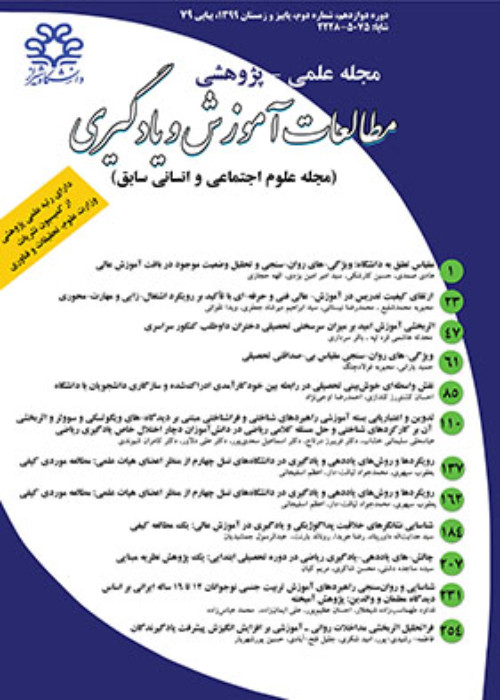The effect of Rational-Emotive-Behavioral Group Counseling of Ellis on Test Anxiety and Self-esteem of Third Grade Middle School Girl Students in Behbahan
Author(s):
Abstract:
IntroductionSometime after the age of 10, humans mature sexually and become capable of reproducing. The period of time during which the reproductive processes mature is known as puberty. Although the most obvious signs of development during puberty are physical changes also occur in cognitive functioning, social interaction, emotions and the sense of self. Adolescence is a longer period of time, and is generally defined as the period from the onset of puberty up to adulthood. Adolescence has traditionally been considered a time of conflict and turmoil; G. Stanley Hall, the first person to study adolescence scientifically, described it as a period of “storm and stress, as well as of great physical, mental and emotional change. Currently, many clinical psychologists and psychoanalytic theories still describe adolescence as a time of psychological disturbance.Test anxiety (TA), as an unpleasant psychological state consisting of both physiological and behavioral concomitants, is usually experienced in the formal testing settings or other evaluative situations (Dusek, 1980). TA presents an important educational problem which negatively affects millions of students’ motivation, acquisition of knowledge, information processing, academic achievement, creativity, and attitudes. Spielberger (1980) defines `worry` and `emotionality` as two important components for TA. The worry component concerns cognitive activities irrelevant to the task at hand, including excessive cognitive anxiety about academic performance, consequence of failure in examination, self-deprecatory thoughts and self-blame, a negativistic assessment of one’s capabilities in comparison with other students, pessimistic expectations from performance and negative self-assertion. The emotional aspect of TA is characterized by subjective feelings of tension, apprehension, uncertainty and activation or arousal of the autonomic nervous system such as heart beat, stomach disturbance, headache, perspiration, and tremor. The aim of this research was to study the effect of rational-emotive-behavioral group counseling of Ellis on Test Anxiety and Self-esteem of female third grade in Behbahan junior high Schools.Research Questions1= Does group consulting according to Ellis's rational, emotional and behavioral method reduce test anxiety among female students of the test group compared to the control group?2= Does group counseling of Ellis's rational, emotional and behavioral method increase general self- esteem among the female students of the test group compared to the control group?MethodThe research design was pretest-posttest with control group. The related population included all female third grade in Behbahan junior high schools in 2008. Nine hundred and eighty students studying in 17 state schools were monitored. The sample consisted of 60 students who suffered from test anxiety and low self-esteem. The participants were randomly chosen in multi stages and of the 17 institutions, 3 schools (institutions) were chosen randomly. The number of students in these institutions was 200. Therefore with regard to the drop of subjects under the test from 188 students of test examination anxiety of Asadi Moghadam and self- esteem test of Cooper Smith have been conducted randomly. It should be mentioned that 12 students were absent in the first day of the examination. Sixty students were subjected to examination anxiety and low self- esteem. These students were randomly divided into 2 groups of test and control groups; each group containing 30 students. In the next stage the students of experimental group were randomly divided into two groups of 15 students for group consulting and ultimately due to the drop of the number of experimental group members, each group was reduced to 12 persons. Therefore 6 persons were randomly dropped from the control group. It should be mentioned that those students were chosen as students suffering from anxiety and low self- esteem whose scores in Asadi Moghadam's test anxiety questionnaire had one deviation norm above and in the Cooper Smith test of self- esteem one deviation below the average. The experimental group received intervention (Rational-Emotive-Behavioral Group Counseling of Ellis) for 12 sessions. For analyzing the data MANOVA method was used.ResultsThe result of MANOVA showed that at least there is a significant difference between two groups in two dependent variables. Then, the significant difference between two groups in two dependent variables was confirmed by ANOVA method.Discussion and conclusionThe results obtained from this research showed that the group counseling according to Ellis's rational, emotional and behavioral method caused a significant decrease in the student's test anxiety. The possible explanation is that as long as irrational thoughts go on, there will be emotional disorders, but once the individual’s irrational beliefs are changed and he faces the life events rationally, such as in a test, then there will not be any anxiety and emotional disorders. In addition, group consulting according to Ellis's rational, emotional and behavioral method resulted in an increase in female student's self-esteem in test group compared to control group. The possible justification is that noticing the individual differences and not comparing self with others and also considering the fact that the main element in producing such conditions is the individual himself and not others, shows that individual plays a determining role in making his fate. This can result in an increase in person's responsibilities and therefore his self-esteem.
Language:
Persian
Published:
Studies in Learning & Instruction, Volume:1 Issue: 2, 2010
Page:
1
https://magiran.com/p966173
دانلود و مطالعه متن این مقاله با یکی از روشهای زیر امکان پذیر است:
اشتراک شخصی
با عضویت و پرداخت آنلاین حق اشتراک یکساله به مبلغ 1,390,000ريال میتوانید 70 عنوان مطلب دانلود کنید!
اشتراک سازمانی
به کتابخانه دانشگاه یا محل کار خود پیشنهاد کنید تا اشتراک سازمانی این پایگاه را برای دسترسی نامحدود همه کاربران به متن مطالب تهیه نمایند!
توجه!
- حق عضویت دریافتی صرف حمایت از نشریات عضو و نگهداری، تکمیل و توسعه مگیران میشود.
- پرداخت حق اشتراک و دانلود مقالات اجازه بازنشر آن در سایر رسانههای چاپی و دیجیتال را به کاربر نمیدهد.
In order to view content subscription is required
Personal subscription
Subscribe magiran.com for 70 € euros via PayPal and download 70 articles during a year.
Organization subscription
Please contact us to subscribe your university or library for unlimited access!




